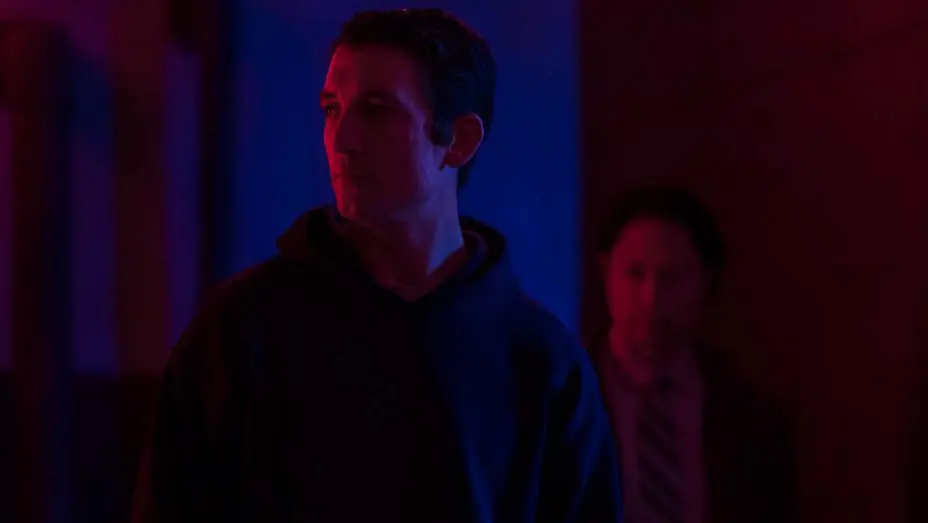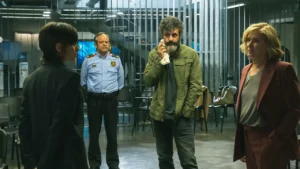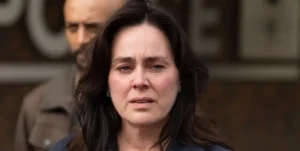Summary
There are muses and there are monsters; some bad, some ugly, but this is a world where good was buried in a child-sized coffin.
This review of Too Old To Die Young is spoiler-free
A TV series that isn’t a TV series had a Cannes premiere and has hacked its audience in half with its polarising putrescence; it can only have been made by Nicholas Winding Refn. The great Dane brings us an opus of opulence as Too Old To Die Young’s thirteen-hour runtime is stretched across ten episodes. A director such as NWR – whose filmic watermarks are debauchery, masculinity, ultraviolence, gore, flesh, and female beauty all beneath neon lighting and synthetically scored by Cliff Martinez – whose been given a fat budget and carte blanche is heartening for us all. We live in a world where someone so divisive yet so unique is allowed to make the art he envisions in the most bombastic brushstrokes.
There are muses and there are monsters; some bad, some ugly, but this is a world where good was buried in a child-sized coffin. LA is sprawling yet empty here. Perhaps there are a lot of good people in ours because Refn’s is a devilish playground for the stoic characters. Rather than showcase the bustling city we usually witness as full of life and verve, even in the seedy neon nightscapes, Too Old To Die Young vacuums it clean just to squirt its stench all over it, making the squat streets reek with isolation. Martin Jones (a statuesque Miles Teller) is an LA county sheriff who patrols the dead streets with deader eyes. Though he’s presented as the protagonist in this LA that’s either sun-bleached or neon-drenched, we know next to nothing about him and can discern even less for his staunch apathy. His seventeen-year-old schoolgirl sweetheart is Janey (Nell Tiger Free), who humanizes Martin only slightly as their relationship is quieter than a library with a fascistic hushing librarian.
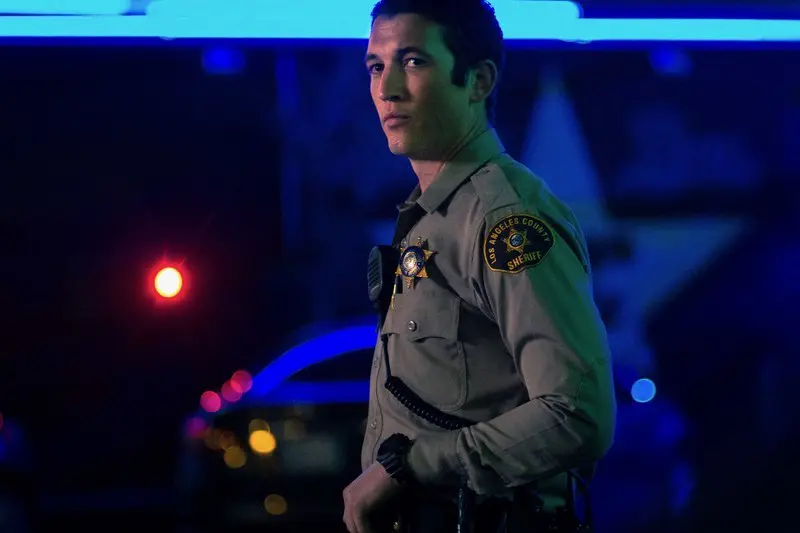
And speaking of fascism, Too Old To Die Young skewers our modern times where the American eagle seemingly only flaps with its gun-toting right wing. Martin’s vigilante friend, Viggo (John Hawkes), listens to radio broadcasts in his car that hurls vitriol at liberalism and idealism to prop up the rhetoric that, if the great race of American dreamers doesn’t take their whiteful place, then a nightmare apocalypse will be upon us all. That rhetoric seeps into Viggo as he tells Martin that the US will be washed away by a ‘sea of barbarian hordes’. This is one of the many examples of the titular theme. Age and how we garner the years that lead to our death. This America is old enough now to not hide behind its age, old enough to know better yet it digresses. It is a place where silent anti-heroes (at a stretch) like Martin and Viggo, both extra-curricular hitmen, subsist because the pageantry and pomposity of masculine stoicism became the ruling religion. All of the characters are somehow brutish and baby-like and none are safe from the encroaching terror that is their sordid pasts, snapping behind them like a charred cape caught in a gale.
I’ve seen a lot written about the ‘glacial pace’ which is not only true but also false. Glaciers are melting at an unprecedented rate and therefore are moving faster than ever, so if we can be done with the lazy allusions, I’ll get back to reviewing Too Old To Die Young and hitch my high horse. The pace of the show is less slow than it is fitting to the sparsity of the glamorous yet barren world and its glamorously barren people. Episode Two, which travels to Mexico for its entirety to follow Jesus’ (Augusto Aguilera bringing the pout) self-imposed exile from LA after shooting Martin’s cop partner in the face at the beginning of Episode One, is stagnant. At feature length, the corpse-pace pans and record-beating staring contests amount to little more than posturing. Here is where NWR glimmers, however, as Jesus and his cartel family do just that, posture their masculinity and tighten their grip on those beneath their power and reign. This episode could easily suffer from the common critique of NWR – all style no substance – as it is a slog to get through. But when you do, you’ll know Jesus and his Uncle’s young, mysterious wife Yaritza (Cristina Rodlo bringing feline poise) both have histories and certainly acidic aspirations for the future that will (obviously) inevitably collide with Martin, Viggo and Jena Malone’s mystical energy soothsayer Diana – think a millennial liberal lioness utilizing spirituality, mysticism, and Buddhist rites to bring rapists to forced karmic justice by bullets belonging to Martin and Viggo – whom layers the aforementioned men with meaning and brings a beating heart to the show.
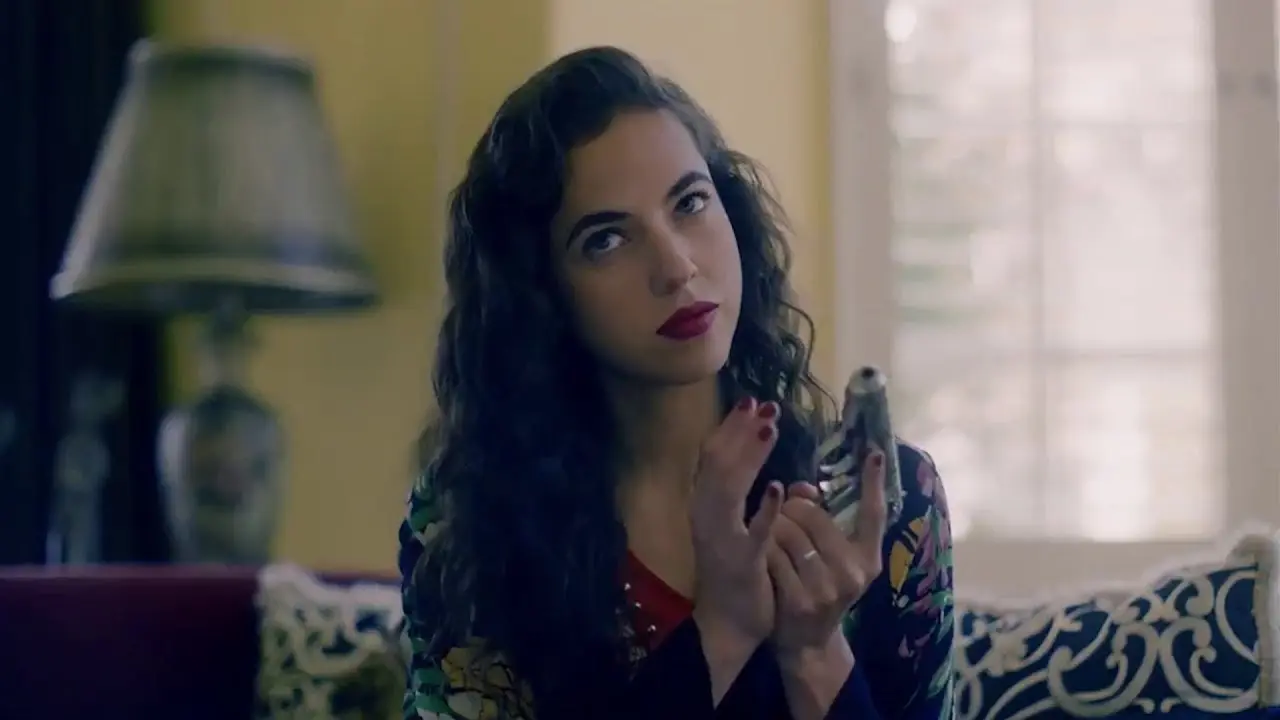
As this is a spoiler-free review, I won’t delve too deeply into the coming plot but there are a few things to dissect, especially as much of Episode 4 and 5 (which feels like a transmuted version of You Were Never Really Here) have been discussed in-depth for they were what was seen by Cannes audiences last year. In Ep 4, Viggo and Martin attempt morality and the dead don’t complain. Through both of these men that kill for a semblance of doing the right thing, that archetypal masculinity begins to drain as we discover their fallibility along with their desperation to feel something, anything. This is also where Refn’s much-loved absurdity (not this prevalent since Bronson) comes into play which gives a welcome break to all the brooding. The police department is seen through Martin’s inner eye, perpetually acting like frat boys, chanting at the Captain’s bigoted idiocy and chanting ‘F A S C -ISM’ with fervor. Martin’s apathy as he sits amongst these morons is hilarious and adds a political agenda which is often absent in NWR’s work. In a later episode, on the communal cop whiteboard, ‘NRA’ is in a love heart and ‘Lock Her Up’ in bold letters. These cops claiming democracy but doling out fascism are the soggy condom for the absent Trump and all that his volatility and lies represent.
Whenever the absurdity rears its head and screams, the originality of NWR bursts like a stomped-on head. When tried tropes (of the Crime genre) blare by like a train, you can bet NWR has put not only the damsel on the tracks but also rigged the bridge with dynamite and cut the brakes, all in vibrant pastiche. The pieces in between the absurdity and the homage, however, can falter for being as shallow as a puddle. Or so you think. As the second half of the series unravels, the crawling camera (some of the pans are interminable) becomes a comforter, as does the pace. Spending those minutes fleshing out a blood-soaked interior as Martin skulks, or Jesus and Yaritza scheme, draws in the senses. And this is a show designed for the sensory as much as the sensual. The more frenetic editing and camera work we’re used to in shows and films with this much violence and plot that centers around killers make me feel dizzy. One shot that I won’t forget is a violet neon-bathed waterpark at night where Viggo stands. And then comes the soundscape.
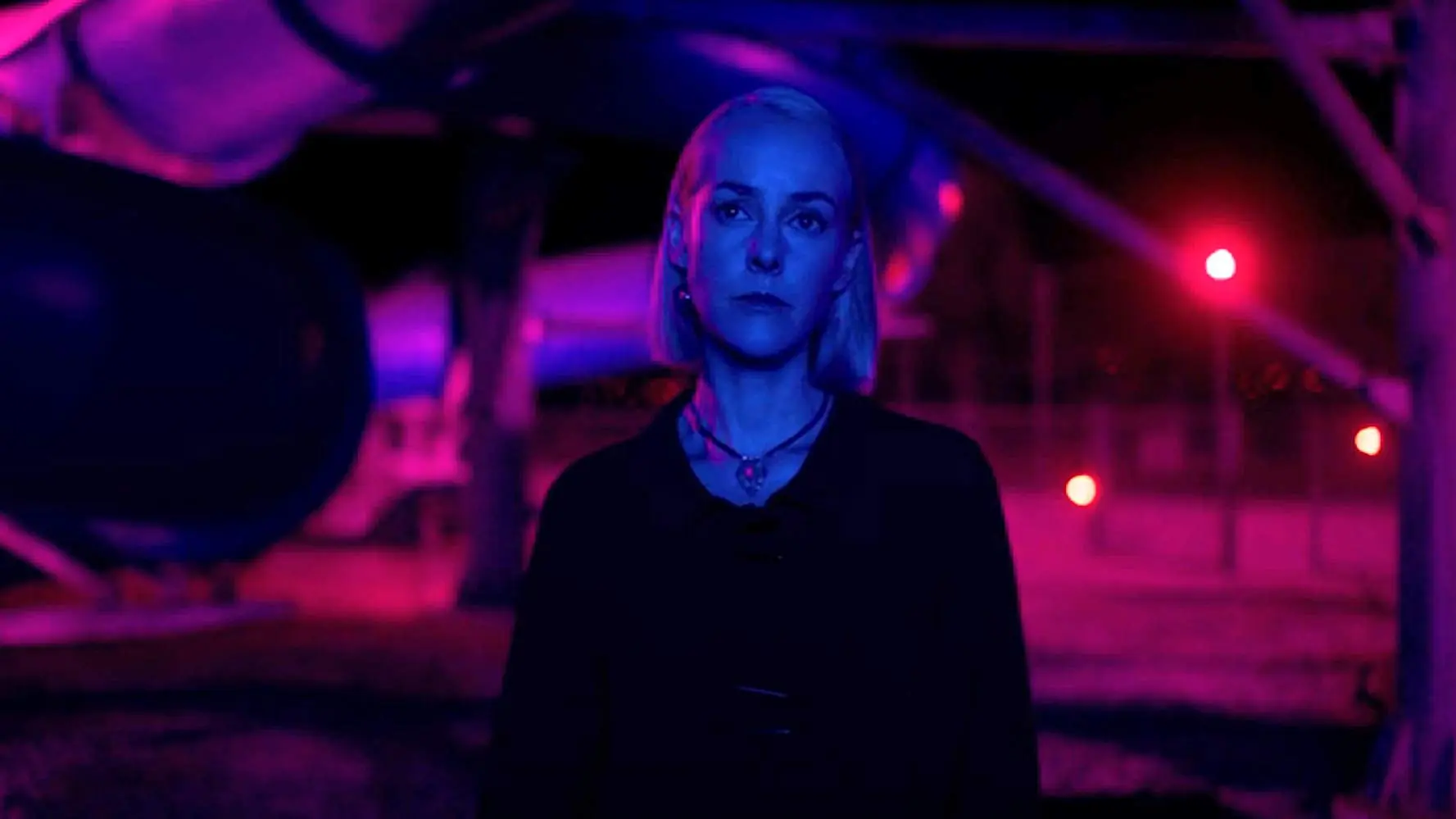
Cliff Martinez (who was briefly in the Red Hot Chilli Peppers in the ’80s) has become a co-conspirator to NWR’s perverse cinematic career. His work on Drive and especially The Neon Demon are delectable. His synthetic scores are beautiful yet bruising; with pulpy drops, tickling chimes, atmospheric hums all warped by an ethereal electronic arena. Though the companion album is only 1 hour and 21 minutes, within the series, he always strikes like a coiler viper. It’s a testament to his skill and NWR’s direction of that skill that 81 minutes of music can feel this impactful against thirteen hours of visuals.
Too Old To Die Young isn’t only NWR’s grotesquery but also career comic book writer Ed Brubaker (whose TV & film credits include Captain America: The Winter Soldier and Westworld). Brubaker, as you’ll be able to discern from Too Old To Die Young, writes (or rewrites) heroes with a grit, grounding them like cement slippers. This collaboration between two writers renowned for dealing with very mature material brings about some salacious storytelling. Rape is a common device – one scene about pornographers taking advantage of a young gay man building toward an inevitable rape is excruciating but also telling of the industry – and child molestation is referred to in almost every episode. These are just the aperitifs. Drugs, murder, incest, some ludicrous sex scenes and wildly inventive impressionism for the decimation of an entire caravan park of white hicks (who are also rapists and killers) are some of the treats in store for Refn’s brand of satire. Women – never getting off too easy in his filmography – are at once objectified and deified. There’s misogyny for sure but its resolutely satirizing the hyper-masculinity of the Mexican cartel lifestyle and also the great American hero. Make no mistake, Yaritza, Janey and Diane are the deepest characters with the most history and humanity, each in starkly varied ways. After The Neon Demon (Refn’s masterpiece), it seems his obsession with beauty may actually be to unveil the beast in us all.
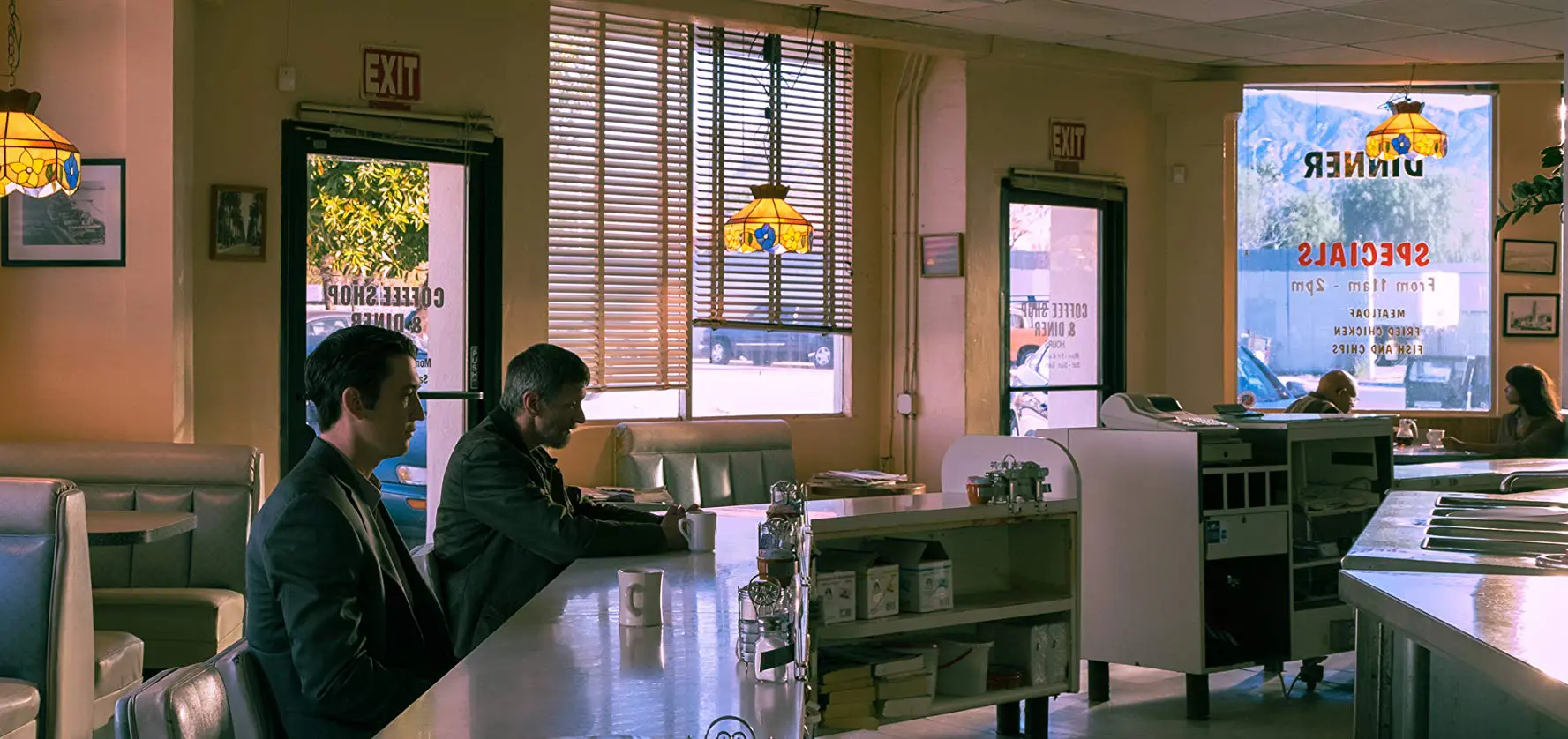
Too Old To Die Young will be hated by some and adored by many, as is always the reception toward Nicholas Winding Refn’s body of work. Another divisive artist that is ritualistically respected here is David Lynch. The neon-noir, the depravity, the sex, guns, violence all melting in a surreal soup. There hasn’t been this bold and tempestuous a show since Twin Peaks: The Return – my most adored work of Lynch’s. There won’t be for a long while either because visionaries – the word, like most grand nomenclature, is thrown around hyperbolically nowadays – like Lynch and Refn are rare beasts. Whilst their work is rarely perfect in terms of leaving its audiences wholly satisfied, it is absolutely their work.
If you haven’t found much joy with NWR before now, you will despise Too Old To Die Young, probably feeling like young droog Alex strapped to a chair with his lids propped open. Though if you’ve ever been hypnotized by even one of Refn’s features, or in fact all of them, then this is mandatory viewing. It has much to say and takes its time to say it, much to see that can never be unseen and so much to hear that’ll continue whispering far after the mouth that uttered it has been fucked or fractured. Birth, rebirth or afterbirth, it matters only that we are all sullied as soon as we breach the borders of this quiet apocalypse we live in. Refn wants to exorcise your demons and embrace the death that’ll punctuate. In the year 2019, we are all too old to die young.

